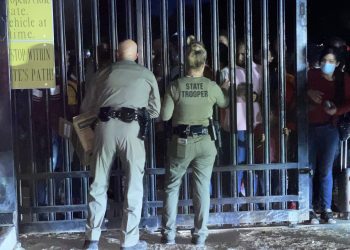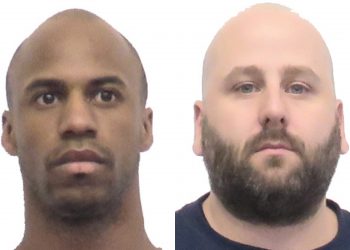DES MOINES, Iowa – During her press conference on Wednesday morning, Gov. Kim Reynolds was non-committal about whether she would sign legislation passed by the Iowa Legislature that allows the permitless carrying of firearms in Iowa.
A reporter asked her whether Reynolds would sign the bill and if she thought concerns that the bill would make it easier for dangerous people to get a firearm were valid.
“You’re not going to be surprised at my answer. So I’m waiting for that to come to my desk. We’ll do a thorough evaluation, as I always have,” she stated.
“I’ve been pretty clear that when we’re talking about gun violence, we need to take a holistic approach. There’s not a single answer. We need to be following the laws that are on the books. We need to make sure that coordination is in place between the agencies. We need to do everything we can to be proactive in just addressing mental health and behavioral health issues,” Reynolds added.
She noted progress her administration has made with addressing mental health in the state with recent reform to Iowa’s adult mental health system and the children’s mental health system recently put into place.
“And I’m proud of the continued progress that we’ve made in that arena we have in that area. We still have a lot of work to do,” Reynolds said. “We’re actually opening up our access centers across the state to help Iowans get stabilized. Give them the treatment that they need, keep them out of prisons, education continues to be a priority, and our campaign ‘See Something, Say Something.’ So, we will continue to take a look at everything, and then we’ll make a decision. We’re reviewing the bill right now.”
As an Iowa State Senator, Reynolds voted for Iowa’s current carry permit system, shifting the state from a “may issue” state that gave county sheriffs broad, subjective discretion over whether to issue a carry permit to a resident who applies for one to a “shall issue” state. The law currently requires county sheriffs to issue a permit to buy or permit to carry unless the applicant is legally ineligible to own or carry a firearm.
It was a significant advance in gun rights for Iowans. Kay Henderson with Radio Iowa asked Reynolds that she, at one time, said she thought Iowa’s current gun laws were “good policy” and whether she still believed that.
Reynolds said that she is willing to look at new legislation that crosses her desk.
“I think that’s the appropriate approach. And that’s what we’re doing right now,” she said.
Along with permitless carry, HF 756 also allows EMTs assigned to a law enforcement tactical team to have a professional permit to carry. It will enable active and reserve law enforcement officers to carry on school grounds whether they are on or off duty. The bill expands handgun safety training. It also strengthens preemption laws to prevent municipalities from further regulating the carrying of firearms beyond what state law allows. The legislation also prevents landlords and government-assisted housing from banning firearms.
The bill increases the penalty when private sellers of firearms sell to people “they know or should reasonably know” are disqualified under state or federal law from owning and carrying a weapon. Those who do that can be charged with a Class D felony which, if convicted, could carry a sentence of up to five years in prison and a fine of up to $7500. Also, those convicted would be disqualified from owning a firearm.
Those who still obtain permits to carry or purchase a firearm undergo a background check. Anyone without a permit who purchases a firearm from a federally licensed dealer will submit to a background check every time they buy a gun.
Opponents of the bill complain that even with enhanced penalties those who are not legally able to have a firearm can still obtain one without a background check during a private sale or transfer if they don’t have a permit. Federal law currently does not require background checks for in-state private sales or transfers of firearms.
HF 756 also invalidates the right to carry for persons under the influence of alcohol and drugs, persons in possession of illegal drugs, and for people in the commission of an indictable offense. These restrictions are added to other prohibitions already in state and federal law.















